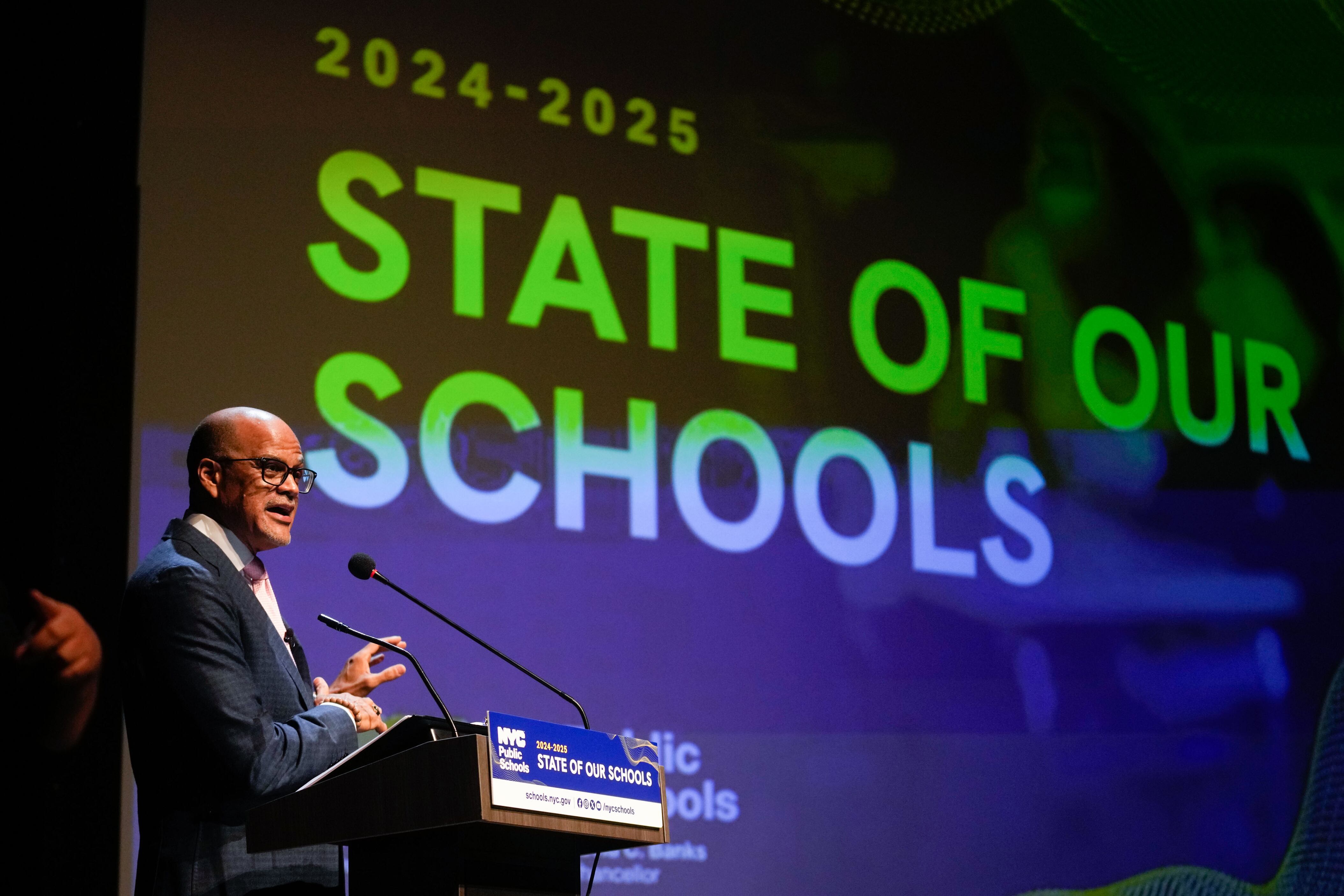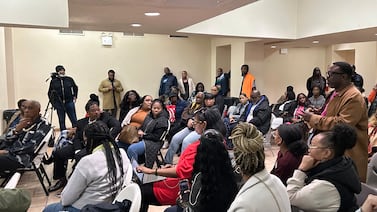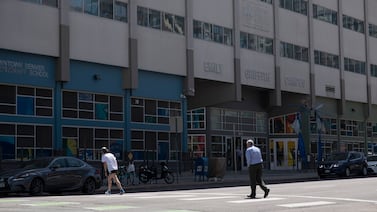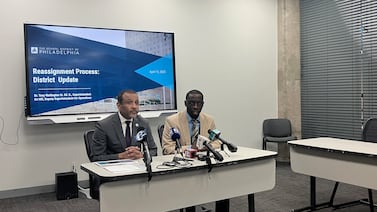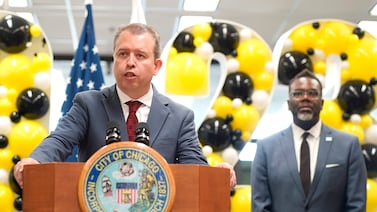Sign up for Chalkbeat New York’s free daily newsletter to keep up with NYC’s public schools.
After ChatGPT exploded in popularity, New York City’s public school system quickly pushed back on the powerful chatbot, arguing it couldn’t help students build critical thinking skills and often spouts misinformation.
Nearly two years later, during his annual “State of Our Schools” speech on Tuesday, schools Chancellor David Banks completed his about-face on artificial intelligence. The school system should get ready to inject the technology into nearly every aspect of its operations, from teaching and learning to transportation and enrollment, he said.
The schools chief laid out an expansive vision that includes customized college advising, instant assessments of student work, personalized instruction, and even replacing annual standardized tests.
“AI can revolutionize how we function as a school system,” Banks told the audience of administrators, elected officials, and union leaders at Frank Sinatra School of the Arts High School in Queens as he outlined his plans for the nation’s largest school system.
Still, Banks acknowledged that the Education Department has no concrete plans, timelines, or cost estimates for those AI projects. The goal is to signal to AI companies that the school system is interested in their technology and wants to hear ideas, he said, adding that officials are convening an advisory council next month to help brainstorm.
Aside from his embrace of AI, the most significant announcement from Banks on Tuesday was a plan to open a new high school in southeast Queens next fall, called HBCU Early College Prep, that will have strong ties to historically Black colleges and universities.
Banks’ annual speech otherwise stuck to promoting initiatives that he has been building since taking office in 2022. He noted that his signature literacy curriculum mandate is rolling out to all elementary schools this fall. He vowed to continue investing in FutureReadyNYC, an initiative in 135 high schools that gives students access to coursework geared toward specific industries and paid internships.
And he noted the city is adding to its library of curriculums focused on underrepresented groups called “Hidden Voices.” The city recently launched materials devoted to people with disabilities, and Banks said the department will offer lessons focused on the Latino community soon.
Though Mayor Eric Adams attended the speech, he did not offer any remarks — a break from the previous year. Adams and several senior members of his administration have been engulfed by multiple federal investigations. Earlier this month, federal agents searched homes or seized electronic devices from Banks, his two brothers, and his romantic partner, First Deputy Mayor Sheena Wright.
Asked about Adams’ lack of a speaking role during the event, Banks declined to comment.
Here are three takeaways from the chancellor’s speech:
Banks thinks AI will become pervasive in the city’s schools
Banks sketched out a few ways he thinks the technology can significantly change the way schools operate. He said the systems could “give teachers a daily, accurate, and comprehensive picture of a child’s progress” based on homework assignments, exams, and other student work.
AI tools could also offer “personalized learning plans for every child” alongside extra instruction based on those plans. The idea, Banks said, is to make it easier for teachers to reach students at a range of academic levels who are all in the same classroom. Still, some previous efforts to promote personalized learning, including by Facebook founder Mark Zuckerberg, have fallen short of their lofty ambitions.
The technology could also provide students with more comprehensive college and career counseling, Banks suggested, drawing on information like employment outcomes at different schools. An Education Department spokesperson did not immediately respond to a question about whether there are any real-world examples of the technology being used in the ways Banks described.
Asked about the technology’s limitations, such as offering incorrect answers to basic math problems, Banks acknowledged it is “not fully baked yet,” but “I wouldn’t be overly concerned about some of the early missteps.”
The schools chief also sought to calm fears about the technology.
“AI will never be able to replace the personal connection that a teacher provides,” he said. “We’re not displacing human beings.”
A new high school is coming to Queens
On the heels of opening two new Bard Early College campuses in Brooklyn and the Bronx, officials said they’re planning to open a third “accelerated” high school this fall in Queens — HBCU Early College Prep.
Officials have previously said opening new campuses is part of a bid to keep families in the city’s public schools, which have seen enrollment drop 9% over the past five years.
The campus will partner with Delaware State University, a historically Black college, and will give students a chance to earn an associate degree before leaving high school.
“They’re also going to be immersed in the history and culture of multiple HBCUs across the country through college visits, the opportunity to study abroad, and research opportunities,” Banks said, adding that there will be “synchronous instruction from professors, alumni, mentors and more.”
Education Department officials said the school will be screened and will give priority to Queens residents.
Spinning up schools that serve specific student populations is in Banks’ wheelhouse. Before becoming chancellor, he helped establish Eagle Academy, a network of public schools geared toward serving young men of color. At the conclusion of his speech on Tuesday, Banks led the crowd in a recitation of the poem Invictus by William Ernest Henley, a daily practice at Eagle.
Tweaks to career-focused learning efforts
City officials are making some tweaks to its FutureReadyNYC initiative, which gives students access to career-connected learning opportunities. Participating schools will be able to add new “industry focus areas” in social work and decarbonization.
That builds on existing tracks in business, education, technology, and health care.
Banks touted a previously announced plan to launch a new high school, Northwell School of Health Sciences, that is designed to prepare students for careers in the health care industry. The school is supported with nearly $25 million from Bloomberg Philanthropies, which Banks said is the single largest grant the school system has ever received. (Chalkbeat receives funding from Bloomberg.)
The chancellor also announced that Mount Sinai Health System will help support the city’s career education efforts.
Alex Zimmerman is a reporter for Chalkbeat New York, covering NYC public schools. Contact Alex at azimmerman@chalkbeat.org.

